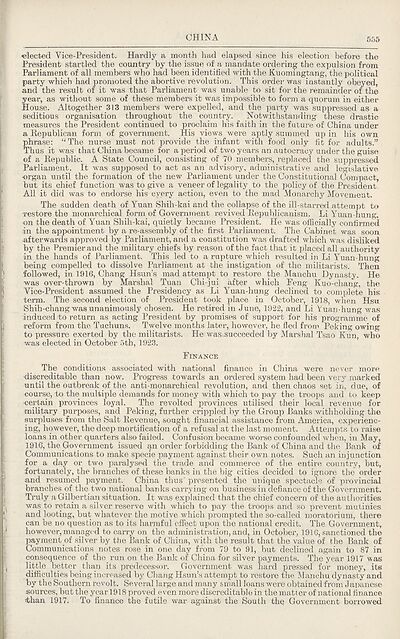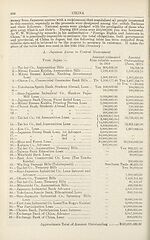1924
(621) Page 555
Download files
Complete book:
Individual page:
Thumbnail gallery: Grid view | List view

CHINA
555
elected Vice-President. Hardly a month had elapsed since his election before the
President startled the country by the issue of a mandate ordering the expulsion from
Parliament of all members who had been identified with the Kuomingtang, the political
party which had promoted the abortive revolution. This order was instantly obeyed,
and the result of it was that Parliament was unable to sit for the remainder of the
year, as without some of these members it was impossible to form a quorum in either
House. Altogether 313 members were expelled, and the party was suppressed as a
seditious organisation throughout the country. Notwithstanding these drastic
measures the President continued to proclaim his faith in the future of China under
a Kepublican form of government. His views were aptly summed up in his own
phrase: ‘‘ The nurse must not provide the infant with food only fit for adults.”
Thus it was that China became for a period of two years an autocracy under the guise
of a Republic. A State Council, consisting of 70 members, replaced the suppressed
Parliament. It was supposed to act as an advisory, administrative and legislative
organ until the formation of the new Parliament under the Constitutional Compact,
but its chief function was to give a veneer of legality to the policy of the President,
All it did was to endorse his eyery action, even to the mad Monarchy Movement.
The sudden death of Yuan Shih-kai and the collapse of the ill-starred attempt to
restore the monarchical form of Government revived Republicanism. Li Yuan-hung,
on the death of Yuan Shih-kai, quietly became President. He was officially confirmed
in the appointment by a re-assembly of the first Parliament. The Cabinet was soon
afterwards approved by Parliament, and a constitution was drafted which was disliked
by the Premier and the military chiefs by reason of the fact that it placed all authority
in the hands of Parliament. This led to a rupture which resulted in Li Yuan-hung
being compelled to dissolve Parliament at the instigation of the militarists. Then
followed, in 1916, Chang Hsun’s mad attempt to restore the Manchu Dynasty. He
was over-thrown by Marshal Tuan Chi-jui after which Feng Kuo-chang, the
Vice-President assumed the Presidency as Li Yuan-hung declined to complete his
term. The second election of President took place in October, 1918, when Hsu
Shih-chang was unanimously chosen. He retired in June, 1922, and Li Yuan-hung was
Induced to return as acting President by promises of support for his programme of
reform from the Tuchuns. Twelve months later, however, he fled from Peking owing
to pressure exerted by the militarists. He was.succeeded by Marshal Tsao Kun, who
was elected in October 5th, 1923.
Finance
The conditions associated with national finance in China were never more
■discreditable than now. Progress towards an ordered system had been very marked
until the outbreak of the anti-monarchical revolution, and then chaos set in, due, of
course, to the multiple demands for money with which to pay the troops and to keep
■certain provinces loyal. The revolted provinces utilised their local revenue for
military purposes, and Peking, further crippled by the Group Ranks withholding the
surpluses from the Salt Revenue, sought financial assistance from America, experienc¬
ing, however, the deep mortification of a refusal at the last moment. Attempts to raise
loans in other quarters also failed. Confusion became worse confounded when, in May,
1916, the Government issued an order forbidding the Bank of China and the Bank of
Communications to make specie payment against their own notes. Such an injunction
for a day or two paralysed the trade and commerce of the entire country, but,
fortunately, the branches of these banks in the big cities decided to ignore the order
and resumed payment. China thus' presented the unique spectacle of provincial
branches of the two national banks carrying on business in defiance of the Government.
Truly aGilbertian situation. It was explained that the chief concern of the authorities
was to retain a silver reserve with which to pay the troops and so prevent mutinies
and looting, but whatever the motive which prompted the so-called moratorium, there
can be no question as to its harmful effect upon the national credit. The Government,
however, managed to carry on the administration, and, in October, 1916, sanctioned the
payment of silver by the Bank of China, with the result that the value of the Bank of
Communications notes rose in one day from 79 to 91, but declined again to 87 in
consequence of the run on the Bank of China for silver payments. The year 1917 was
little better than its predecessor. Government was hard pressed for money, its
difficulties being increased by Chang Hsun’s attempt to restore the Manchu dynasty and
by the Southern revolt. Several large and many small loans were obtained from Japanese
sources, but the year 1918 proved even more discreditable in the matter of national finance
than 1917. To finance the futile war against the South the Government borrowed
555
elected Vice-President. Hardly a month had elapsed since his election before the
President startled the country by the issue of a mandate ordering the expulsion from
Parliament of all members who had been identified with the Kuomingtang, the political
party which had promoted the abortive revolution. This order was instantly obeyed,
and the result of it was that Parliament was unable to sit for the remainder of the
year, as without some of these members it was impossible to form a quorum in either
House. Altogether 313 members were expelled, and the party was suppressed as a
seditious organisation throughout the country. Notwithstanding these drastic
measures the President continued to proclaim his faith in the future of China under
a Kepublican form of government. His views were aptly summed up in his own
phrase: ‘‘ The nurse must not provide the infant with food only fit for adults.”
Thus it was that China became for a period of two years an autocracy under the guise
of a Republic. A State Council, consisting of 70 members, replaced the suppressed
Parliament. It was supposed to act as an advisory, administrative and legislative
organ until the formation of the new Parliament under the Constitutional Compact,
but its chief function was to give a veneer of legality to the policy of the President,
All it did was to endorse his eyery action, even to the mad Monarchy Movement.
The sudden death of Yuan Shih-kai and the collapse of the ill-starred attempt to
restore the monarchical form of Government revived Republicanism. Li Yuan-hung,
on the death of Yuan Shih-kai, quietly became President. He was officially confirmed
in the appointment by a re-assembly of the first Parliament. The Cabinet was soon
afterwards approved by Parliament, and a constitution was drafted which was disliked
by the Premier and the military chiefs by reason of the fact that it placed all authority
in the hands of Parliament. This led to a rupture which resulted in Li Yuan-hung
being compelled to dissolve Parliament at the instigation of the militarists. Then
followed, in 1916, Chang Hsun’s mad attempt to restore the Manchu Dynasty. He
was over-thrown by Marshal Tuan Chi-jui after which Feng Kuo-chang, the
Vice-President assumed the Presidency as Li Yuan-hung declined to complete his
term. The second election of President took place in October, 1918, when Hsu
Shih-chang was unanimously chosen. He retired in June, 1922, and Li Yuan-hung was
Induced to return as acting President by promises of support for his programme of
reform from the Tuchuns. Twelve months later, however, he fled from Peking owing
to pressure exerted by the militarists. He was.succeeded by Marshal Tsao Kun, who
was elected in October 5th, 1923.
Finance
The conditions associated with national finance in China were never more
■discreditable than now. Progress towards an ordered system had been very marked
until the outbreak of the anti-monarchical revolution, and then chaos set in, due, of
course, to the multiple demands for money with which to pay the troops and to keep
■certain provinces loyal. The revolted provinces utilised their local revenue for
military purposes, and Peking, further crippled by the Group Ranks withholding the
surpluses from the Salt Revenue, sought financial assistance from America, experienc¬
ing, however, the deep mortification of a refusal at the last moment. Attempts to raise
loans in other quarters also failed. Confusion became worse confounded when, in May,
1916, the Government issued an order forbidding the Bank of China and the Bank of
Communications to make specie payment against their own notes. Such an injunction
for a day or two paralysed the trade and commerce of the entire country, but,
fortunately, the branches of these banks in the big cities decided to ignore the order
and resumed payment. China thus' presented the unique spectacle of provincial
branches of the two national banks carrying on business in defiance of the Government.
Truly aGilbertian situation. It was explained that the chief concern of the authorities
was to retain a silver reserve with which to pay the troops and so prevent mutinies
and looting, but whatever the motive which prompted the so-called moratorium, there
can be no question as to its harmful effect upon the national credit. The Government,
however, managed to carry on the administration, and, in October, 1916, sanctioned the
payment of silver by the Bank of China, with the result that the value of the Bank of
Communications notes rose in one day from 79 to 91, but declined again to 87 in
consequence of the run on the Bank of China for silver payments. The year 1917 was
little better than its predecessor. Government was hard pressed for money, its
difficulties being increased by Chang Hsun’s attempt to restore the Manchu dynasty and
by the Southern revolt. Several large and many small loans were obtained from Japanese
sources, but the year 1918 proved even more discreditable in the matter of national finance
than 1917. To finance the futile war against the South the Government borrowed
Set display mode to:
![]() Universal Viewer |
Universal Viewer | ![]() Mirador |
Large image | Transcription
Mirador |
Large image | Transcription
Images and transcriptions on this page, including medium image downloads, may be used under the Creative Commons Attribution 4.0 International Licence unless otherwise stated. ![]()
| Asian directories and chronicles > 1924 > (621) Page 555 |
|---|
| Permanent URL | https://digital.nls.uk/196431956 |
|---|
| Attribution and copyright: |
|
|---|---|
| Description | Volumes from the Asian 'Directory and Chronicle' series covering 1917-1941, but missing 1919 and 1923. Compiled annually from a multiplicity of local sources and research. They provide listings of each country's active corporations, foreign residents and government agencies of all nationalities for that year, together with their addresses. Content includes: various treaties; coverage of conflicts; currencies and taxes; consular fees; weights and measures; public holidays; festivals and traditions. A source of information for both Western states and communities of foreigners living in Asia. Published by Hongkong Daily Press. |
|---|---|
| Shelfmark | H3.86.1303 |
| Additional NLS resources: |
![[Page 554]China](https://deriv.nls.uk/dcn4/1964/3194/196431945.4.jpg)
